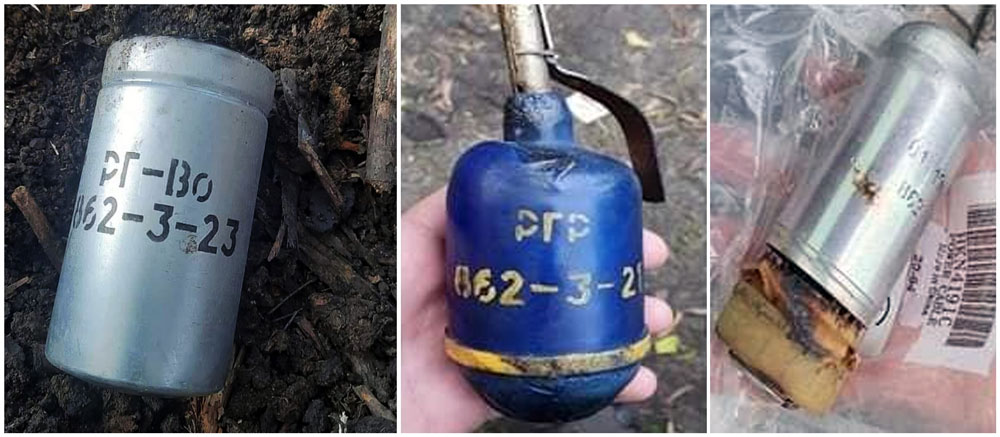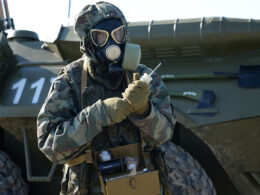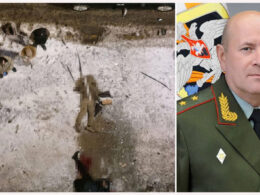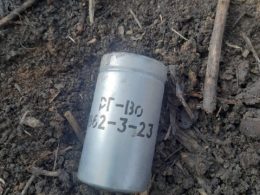The Organization for the Prohibition of Chemical Weapons (OPCW) has confirmed the presence of prohibited tear gas in samples collected from Ukraine's conflict zone, following an alleged incident near the village of Illinka in eastern-central Ukraine's Dnipropetrovsk Oblast.
According to the OPCW report released on 18 November 2024, the organization's technical team identified 2-Chlorobenzylidenemalononitrile (CS) in samples collected from a trench along confrontation lines between opposing forces.
The compound 2-chlorobenzalmalononitrile, a cyanocarbon, is the key component of CS gas, a tear gas commonly used as a riot control agent but banned in warfare under the 1925 Geneva Protocol.
Illinka Village, situated south of Marhanets town in Nikopol district, faces the Russian-occupied Enerhodar and Zaporizhzhia Nuclear Power Plant. Russian forces launch daily artillery and drone attacks on the district from positions near the nuclear facility, confident that Ukraine will avoid retaliation to prevent risking damage to the plant.
The organization says the incident reportedly took place on 20 September. The OPCW Technical Secretariat deployed a team of experts to Ukraine following the country's request under subparagraph 38(e) of Article VIII of the Chemical Weapons Convention (CWC).
OPCW Director-General Ambassador Fernando Arias voiced serious concern over the findings, stating:
"All 193 OPCW Member States, including the Russian Federation and Ukraine, have committed never to develop, produce, acquire, stockpile, transfer or use chemical weapons. States Parties to the Chemical Weapons Convention have declared that any use of chemical weapons is totally unacceptable and would violate the legal norms and standards of the international community."
The investigation team gathered documentation, digital files, and witness testimonies, along with three physical samples - a grenade shell and two soil samples from a trench. Analysis by two OPCW-designated laboratories independently confirmed the presence of CS gas.
Upon receiving the Technical Assistance Visit (TAV) report, Ukraine requested its declassification and sharing with all CWC States Parties, as well as publication on the OPCW website.
Early this year, Ukraine’s Army General Staff reported
626 instances of Russian use of toxic chemical munitions since 2022, including 51 in early January 2024. Russian forces frequently deployed K-51 and RGR grenades via UAVs, improvised explosives with irritants, and artillery shells with hazardous agents. In December 2023, the RG-VO gas grenade containing CS was identified in use. This year, Russia escalated its use of chemical warfare. In May alone, the Chemical, Biological, Radiological, and Nuclear Defense units of the Ukrainian Armed Forces documented 715 instances of Russian munitions containing dangerous chemical compounds.
Under the Convention, while riot control agents may be held for law enforcement purposes, their use as a method of warfare is explicitly prohibited. States Parties must declare all toxic chemical agents held for riot control purposes, and their battlefield use is considered a violation of Article I paragraph 5 of the Convention.
Related:
- Russian artillery strikes Dnipro’s Nikopol, killing two rail workers, injuring five other civilians
- The Washington Post: Satellite images show unusual expansion at closed Soviet biolaboratory near Sergiev Posad
- UK imposes sanctions on Russian chemical warfare commander
- Russia intensifies use of chemical weapons against Ukraine, Ukrainian military reports
- Ukraine presents proof of Russian chemical warfare to international body
- Russian troops 715 times used chemical agents against Ukrainian forces in May
- France, US, UK confirm Russia uses chemical weapons on Ukraine’s front lines
- US accuses Russia of using banned chemical weapon in Ukraine
- Reuters: Russia increases use of prohibited riot control agents against Ukrainian forces on battlefield
- The Telegraph: Russia uses prohibited chemical weapons in Ukraine nearly daily
- ISW: Russia recycles disproven bio and chem weapons allegations against Kyiv to undermine Western support
- Military: Russian troops used chemical munitions some 60 times in past week on Zaporizhzhia front





